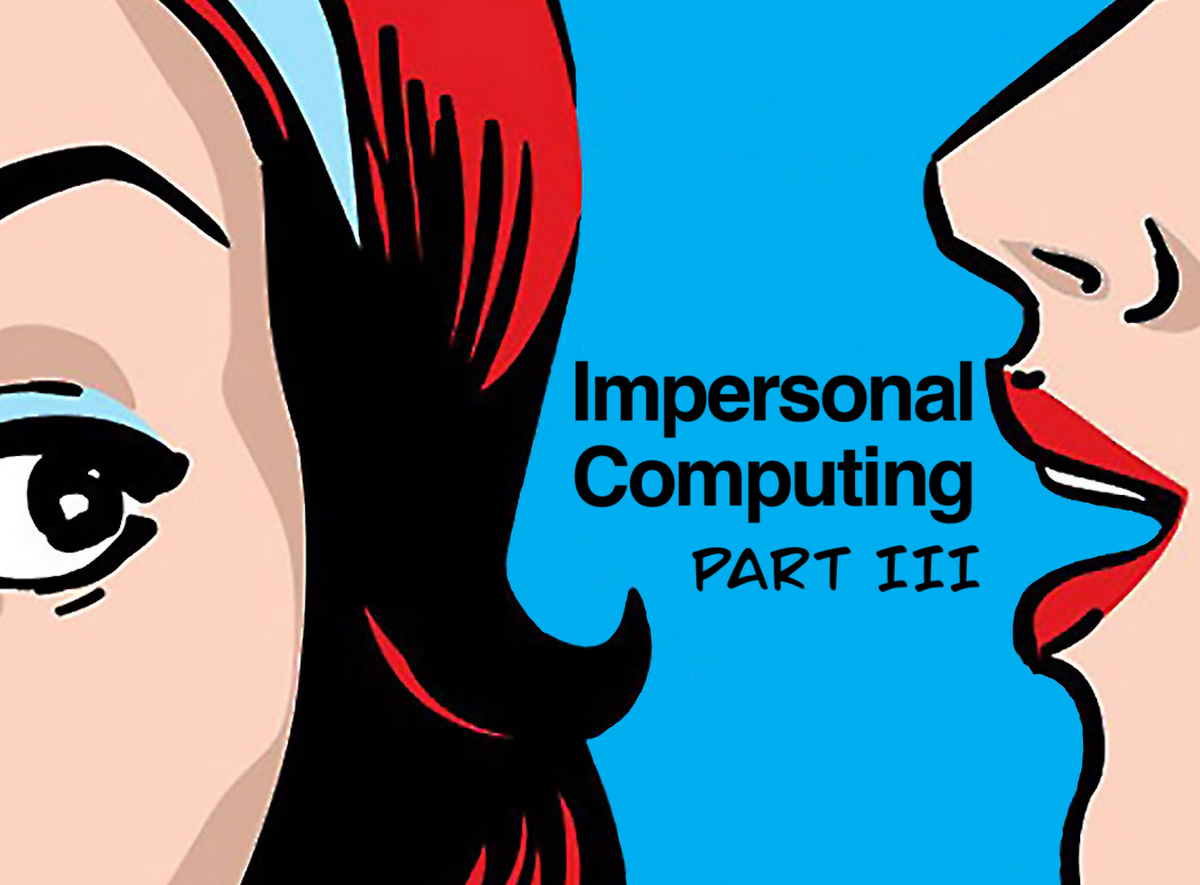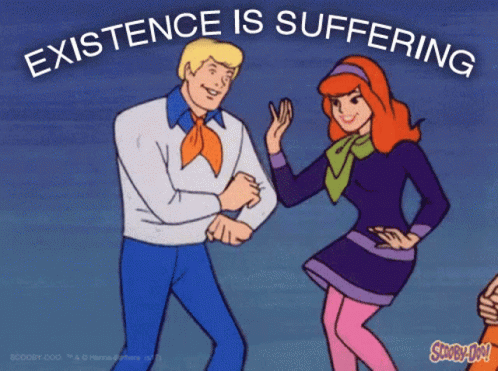Drink Water And Mind My Business

This is Part 3 of the Impersonal Computing series. Check out Part 1 and Part 2.
Unfortunately, the secret to happiness isn't that simple. Don't get me wrong: drinking water is fantastic.
Why does "drink water and mind my own business" resonate? One reason is that it's incredibly irritating when someone you don't want butting into your decisions butts into your decisions, and any decent human being is going to decide not to be that annoying person. The other big reason is that getting involved in other people's business usually ends up blowing up in our faces. The best (and most graphic) way to explain this is by quoting my mother: "it's like throwing a rock into a pile of manure - all you'll get is a face full of crap."
As I've personally dived deeper into understanding why this hits home for me, I've found it's because I think something like, "if other people just left me alone and let me do my work in peace, I'd be perfectly fine!" We could wave this off as the grumbling of an anti-social hermit, but if we look at most of the cultural issues of today, we find that they all boil down to the same problem: people want to be themselves.
This self-centeredness is what I want to write about this week, specifically how that relates to the meditation we've covered over the past few posts. This is Part 3 of the Impersonal Computing series, unpacking why modern technology amplifies our impersonal attitude toward relationships, which is the root cause of our dissatisfaction with life - here are Part 1 and Part 2. You might miss a little context if you haven't read previous parts, but today's exploration of why impersonalism is the root cause of our dissatisfaction should still make sense.
The root cause of our dissatisfaction with life is our impersonal attitudes toward relationships.
In modern society, when we have so many material comforts and are largely isolated from the problems that our ancestors faced - rarely do any of us have to deal with sabertooth tiger attacks or hide our grain from invading Huns - we can think of other people as the sole cause of our problems. But actually, there are three main types of difficulties that we all face, even in our technologically advanced civilization.
No matter who we are, every single one of us has to deal with the following:
- Suffering caused by the mind and body
- Suffering caused by other people
- Suffering caused by higher powers
Especially coming out of Covid, society is waking up to the fact that the suffering of the mind and body affect us all. You may not have gotten sick from Covid, but you most likely dealt with mental illness during the lockdown. Even before the pandemic, mental illness rates were spiking, especially in younger generations.

And even if we don't believe in a superhuman deity, we have to acknowledge that there are forces more powerful than us, such as mother nature or climate change, that can send hurricanes and wildfires to upend our world. Suffering caused by others is easy to grasp, too. Where it becomes difficult is understanding why we suffer.
We suffer because we're not approaching our various relationships with a personal attitude. Analogous to the three types of sufferings outlined earlier, we have three types of relationships:
- Our relationship with ourselves
- Our relationship with others
- Our relationship with higher powers
If we can approach each of these relationships on a personal level, we're going to be better off for it. Any dissatisfaction we have with these relationships will bring us suffering.
Our relationship with ourselves is the most obscure. We often don't take the time to get to know who we are. Defining ourselves as a name or a job, or a gender identity is fine, but none of those define us completely. It's like saying a square is a shape with 4 sides: it's not wrong, but it's not complete, either.
Uncovering this relationship is the foundation of every spiritual path: spiritual progress is shown by greater integration as a person, or how deep you have gone in understanding yourself. One test of spiritual progress is how much you can see the individuality of others. This isn't easy! But a good rule of thumb: if you don't realize you're being tested, you're probably failing the test.

Our relationship with others is the easiest to understand. We suffer from other people because either we're getting into someone's business or someone else is getting into ours. We think those who disagree with us are at best, ignorant and, at worst, evil when in reality, they're neither of those things.
With rare exceptions, other people are just trying their best to make the world better according to the paradigms in their heads. I've lifted this as it is from ancient Sanksrit texts, but if you want a more modern example, one of Sartre's most famous quotes is, "hell is other people." And it's the same principle!
This explains why so many of the conflicts in the world happen: it's a natural function of the self-centered mind to impose its paradigms on others. Whether it's big issues like gay rights, the war in Ukraine, or smaller things like miscommunication in a relationship, the root cause is the same: we're not recognizing the person(s) on the other end.
The solution to our impersonal attitudes and, by extension, all three types of suffering is to inject a mood of service into our relationships. More on that next week, when I'll share some reflections, learnings on how to practice making a personal connection, my takeaways on how to use modern technology in a personal way, and other concluding thoughts.
Mandatory disclaimer here: just because I've observed this doesn't mean I'm perfect and personal with everyone I meet. Applying these lessons is an austerity that takes lifetimes - again, it's not easy! Breaking out of self-centeredness and having something else in the center takes hard work.
Happy to be here,
-Sid




